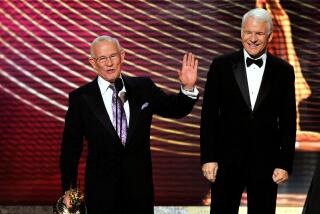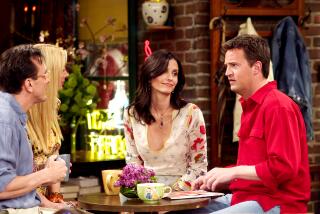Burgess Meredith, Actor’s Actor for 70 Years, Dies
- Share via
Burgess Meredith, who displayed his versatile acting skills in a series of always refreshing but generally eccentric roles that kept him before cameras or onstage for more than 70 years, has died.
The raspy-voiced character actor with unruly hair and a grimacing yet humorous nature was 89.
He died Tuesday at his home in Malibu, said his son, Jonathan. Survivors also include his wife, Kaja, and daughter, Tala. A memorial service is pending.
Meredith, whose early credits included “Hamlet” and “Macbeth,” found an entire new career late in life as a scheming villain on television and as Rocky Balboa’s crusty manager in films.
On Wednesday, Sylvester Stallone, star of “Rocky,” said in a statement that “without [Meredith’s] participation in the film it would never have had its emotional core.”
If the phrase “actor’s actor” has any validity, Meredith was its prototype.
He was known among his peers and to critics as one of the most adaptive thespians on stage or film set. His roles ranged from the idealistic and protective migrant worker forced to kill his retarded cousin in “Of Mice and Men” to Shakespeare’s stoic Hamlet, whom he played on national radio in 1937 in the infancy of his career.
Later would come the Burgess Meredith who played Mickey, the aging boxing manager who fulfills the dream of his youth through the over-the-hill fighter Rocky. Or the wily and fiendish Penguin, one of Batman’s prime adversaries on the campy and highly popular 1960s TV series.
Perhaps the television role that will linger longest with viewers was in an episode of “The Twilight Zone” in the early 1960s. In “Time Enough at Last,” Meredith played a bank teller who preferred reading to the company of people. One day he had retreated to the bank’s vault to eat his lunch and read in peace when a nuclear attack killed everyone else in the world.
After emerging from the vault and determining that he was the last of his species, Meredith’s character briefly relished his opportunity to finally have the time for his beloved books. Then he tripped in the rubble that symbolized the end of civilization and broke his glasses.
Meredith’s credits sprawl across multiple pages in drama anthologies--as director, actor, writer and producer of plays as obscure as “The Green Cockatoo” and motion pictures as famous as “Rocky.”
In a single television season (1963) he portrayed a mad pacifist, a botanist whose specialty was man-eating plants, a father with incestuous tendencies and a diabolical brother who hated his sibling.
He was an early and inveterate cross-country airline passenger, juggling films between stage appearances and managing, generally, to keep his sense of humor.
Even through four marriages.
He told a Times interviewer in 1976: “I’m not the nostalgic type. I hardly visit my ex-wives.” (Among them was actress Paulette Goddard.)
He was nominated twice for an Academy Award (for “The Day of the Locust” in 1975 and for “Rocky” in 1976) but didn’t win. He won an Emmy in 1977 for his portrayal of attorney Joseph Welch in “Tail Gunner Joe,” a TV special about Sen. Joseph McCarthy, and was nominated for a second Emmy for “The Last Hurrah.” He won a special Tony Award for his 1960 staging of a “A Thurber Carnival.” He also was nominated for another Tony for directing “Ulysses in Nighttown.”
The relatively sparse recognition became a personal joke, and he sent The Times a satirical fantasy in 1980 in which he presided over a company of what he called “non-awarded actors.”
Included were Greta Garbo, Rudolph Valentino, John Barrymore and Rin Tin Tin, all cast as worthy dramatic prophets without honor in their own Hollywood.
“I disappear from the public eye and get rediscovered quite often,” Meredith would say over the years. His most recent dramatic resuscitation didn’t appear to impress him any more than had his earlier revivals.
But if he never became the choice of the Academy of Motion Picture Arts and Sciences, there were others who honored him.
One was Ernie Pyle, who selected Meredith to portray him in the film based on the war correspondent’s book, “The Story of G.I. Joe.”
Both were diminutive men known to take an occasional drink, and both hated pretense.
Meredith was nicknamed “Buzz,” and it could have been for his volatility. Privately, he was an avid environmentalist who complained about a neighbor cutting down a favorite tree to build a tennis court next to his home. Publicly, he once was forced to restrain his eccentric old friend Zero Mostel from leaving the stage during a performance of a play Meredith was directing.
Meredith began life as George Burgess, son of a Cleveland doctor. The family dissolved early on and Meredith said he took solace in acting in school plays.
He was accepted at Amherst College on a scholarship in 1926. But finances forced him to leave school, and he worked as a merchant seaman, a tie salesman and a peddler of vacuum cleaners before drifting to New York and Eva Le Gallienne’s Student Repertory Group.
“I had no money,” Meredith said in a 1976 interview. “But Eva took me in.”
He left her group for roles in “Threepenny Opera,” “Little Ol’ Boy,” “The Barretts of Wimpole Street” and many other Broadway and off-Broadway productions in the early 1930s.
Playwright Maxwell Anderson became aware of his talents and wrote a play called “Winterset” with Meredith in mind. A melodrama of a son out to avenge his father’s death, it became not only a Broadway hit in 1935 but also a motion picture a year later with Meredith recreating his role as the son, Mio.
Thus began the first of the cross-country treks.
Mio was the first of three stage portrayals that established him as a significant actor. The other two were Van Van Dorn, who escapes civilization for a single evening in “High Tor” (1937), and Stephen Minch, who is permitted to return to the years of his youth in “The Star Wagon” (also 1937).
Critic Wolcott Gibbs praised him in the New Yorker as “brilliant, impressive, heartbreaking, vibrant and eloquent.”
His New York performances over the years included such classics as “The Playboy of the Western World,” “The Fourposter,” (succeeding Hume Cronyn), “The Teahouse of the August Moon,” (succeeding David Wayne) and “Major Barbara.”
On film he performed in a few minor pictures before landing the part of George in “Of Mice and Men” in 1940. It was to prove one of the few films that made full use of Meredith’s abilities. Film critic Anthony Slide, in recalling Gibbs’ praise in an article he wrote for the anthology “Actors and Actresses,” noted that “Gibbs was, of course, talking of Meredith, the stage performer. Sadly, there are only a handful of film roles which live up to that estimation.”
It proved an all too true assessment of Meredith’s film and TV work. For while he said publicly that he drew equal pleasure from film and stage performances, he seldom turned down an opportunity to leave Hollywood for Broadway.
His screen performances included “Mackenna’s Gold” in 1969, “The Hindenburg” in 1975, “Foul Play” in 1978, “Clash of the Titans” in 1981, “Santa Claus: The Movie” in 1985, “Grumpy Old Men” in 1993 and its 1995 sequel “Grumpier Old Men.”
Two pictures he took particular pride in were not even done for general audiences but for World War II servicemen: “Welcome to Britain” and “Salute to France,” which he produced and acted in for the Office of War Information. Another favorite was “The Diary of a Chambermaid,” a 1946 film directed by Jean Renoir that Meredith adapted from the novel and appeared in with Goddard.
He became a friend and confidant of Katharine Cornell, Alfred Lunt and Lynn Fontanne and the rest of the artful Manhattan crowd. Meredith and James Thurber became close friends late in the humorist’s life, resulting in a blending of Meredith’s dramatic skills and Thurber’s words in “A Thurber Carnival” on Broadway shortly before Thurber’s death in 1961.
In 1994 Meredith wrote a memoir, “So Far, So Good,” in which he reminisced about the giants who had walked through his theatrical world.
On TV, Meredith’s first assignment came in 1952 and he later became producer and host of “Junior Ford Omnibus” and “Excursion.” As with his films, his television appearances cut a wide critical swath and ranged from Eugene O’Neill’s “Ah, Wilderness” on the Hallmark Hall of Fame to guest shots on “Laredo” and “McCloud.”
He was the host of television’s “Those Amazing Animals” in 1980, and earlier was a regular on the “Mr. Novak” and “Search” series.
In an interview he granted in 1975 with the release of “The Day of the Locust,” a picture that was a box-office disaster, Meredith--in what could have been an assessment of his professional life--said his portrayal of a broken-down vaudevillian selling miracle drugs door to door was “as good as I can be.”
He always was.
More to Read
Only good movies
Get the Indie Focus newsletter, Mark Olsen's weekly guide to the world of cinema.
You may occasionally receive promotional content from the Los Angeles Times.










